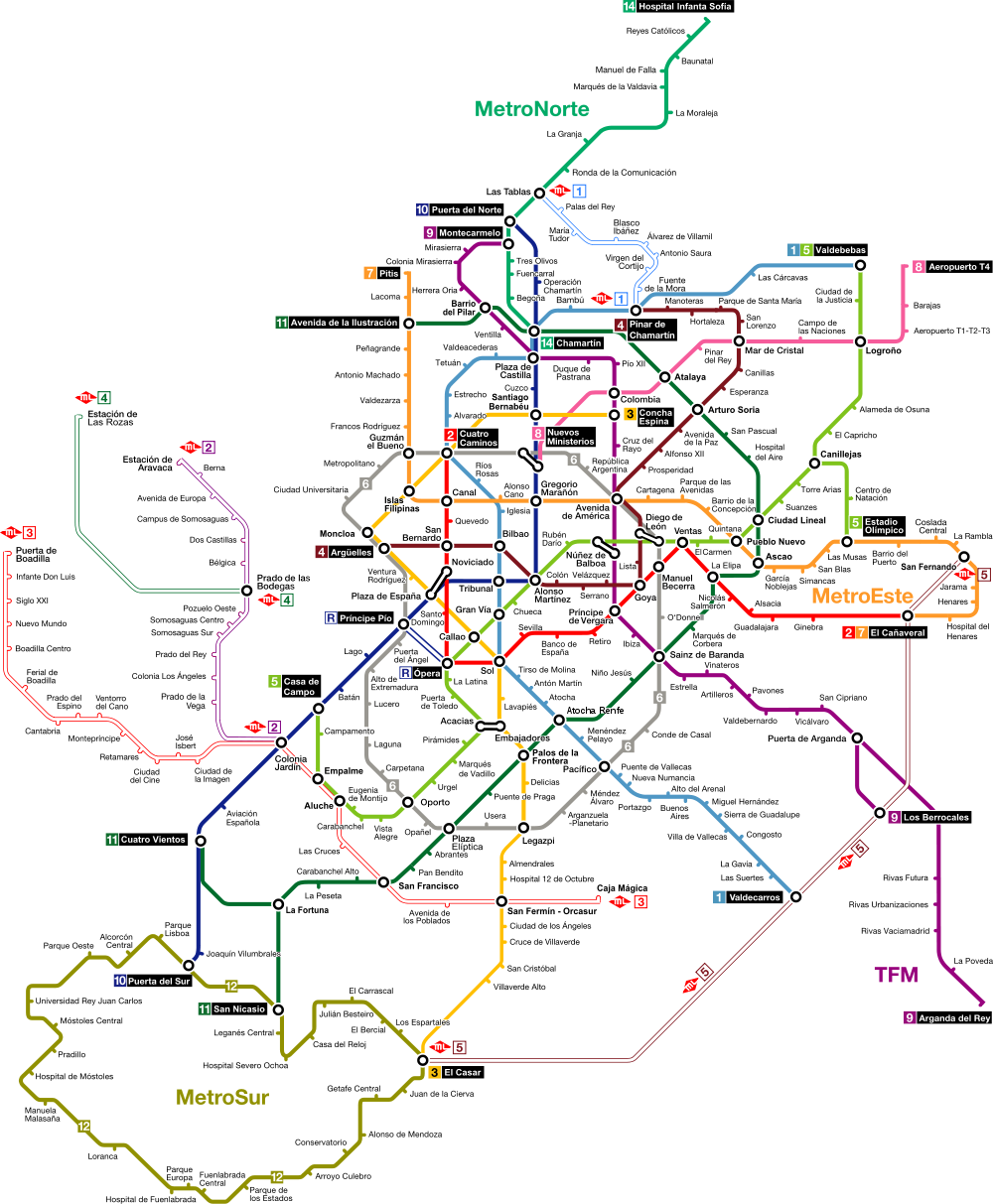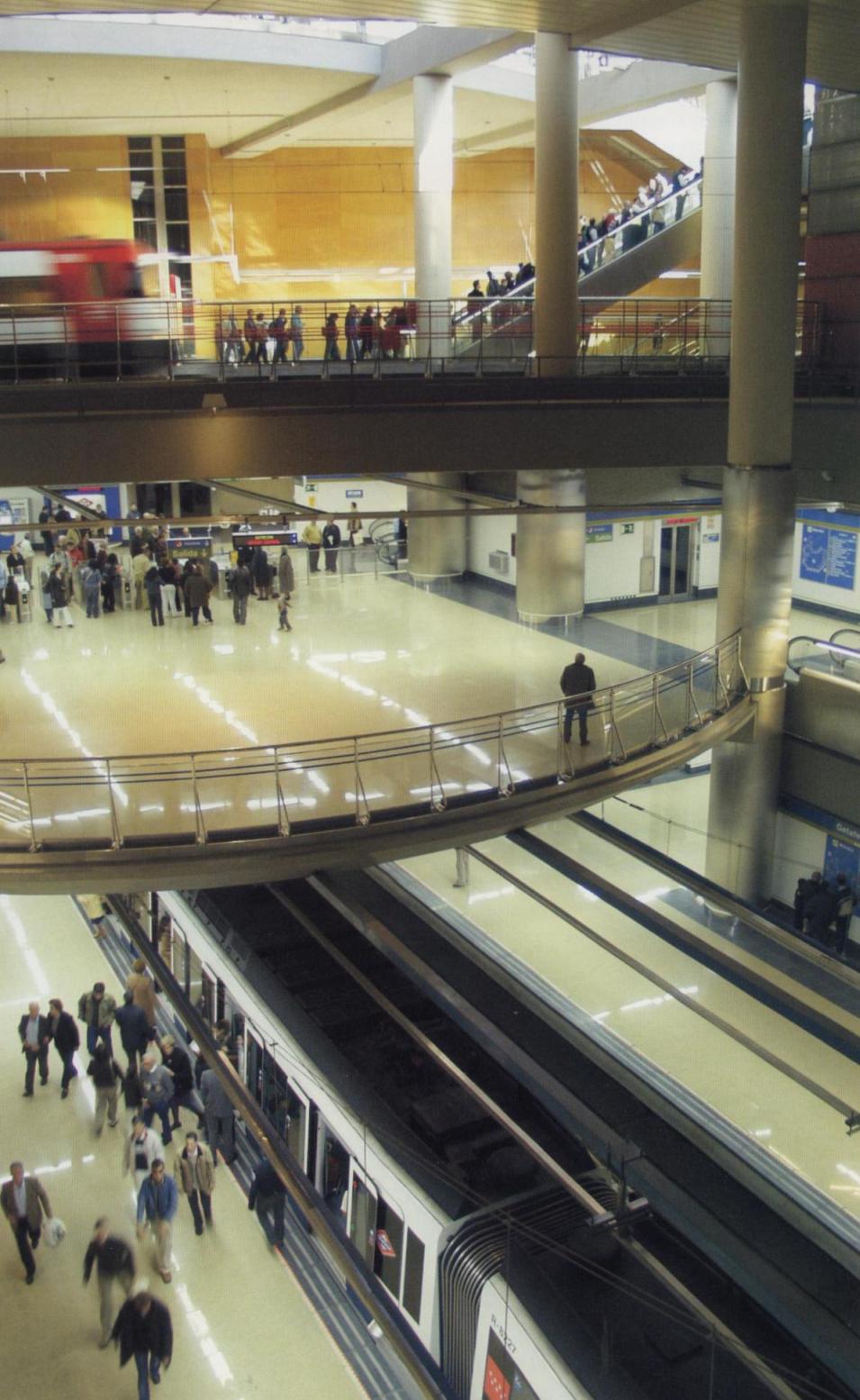Filip
Senior Member
Old thread, I remember reading it years ago without a single clue I'd be one day living here!
Madrid.. oh what to say? Well, one thing will be when I go back to Toronto I'm going to be complaining why there isn't a subway stop in front of my house. The goal of the Comunidad de Madrid (provincial government) is that not ONE house in the city of Madrid is more than a 5 minute walk from a metro stop. I have a friend here who's father works in the Infrastructure Development Ministry for the Comunidad, and he told me that 15 years ago when they began planning these expansions the mayor and his chief transit person (whatever he's called here, I have no idea) just took a map of Madrid, with the superimposed metro lines and just began colouring lines. One here, one here, one here, Oh! a hole here, we should fill it up with another line.. etc etc until the city basically looked like a bowl of multicoloured spaghetti.
I live in the dead centre of the city, which means that from my house I have NUMEROUS stations right around the corner. One minute walk takes me to La Latina on the green line, two minute walk takes me to Tirso de Molina on the light blue line, 3 minute walk takes me to Sol which has the red, light blue and yellow lines including a cavernous feat of engineering the new Sol Cercanias station, a 4 minute walk takes me to Opera which has the red line, the green line and the shuttle to Principe Pio station. It is that feeling of connectivity that makes me think that Madrid is a very small city, but small it is definitely not. The distances are quite big and are amplified by this strange greenbelt to the west of the city called Casa de Campo.
However, the trains are much smaller than Toronto's; the trains are shorter, narrower and don't run on third rail, but on a suspended third rail above the train where a squashed pantograph runs along it. Also, the trains run the opposite way (imagine London driving but in the subway). Definitely though, the newer stations are cavernous and remind me of the TTC's notorious overbuilding (not that I complain, I love cavernous cathedral-like stations).
Here's a few examples:
Madrid's metro network upon completion of the current set of expansion (2016)

Typical 'older' station from the 30s

New station on MetroSur with an elevated interchange with the Regional Railway (Cercanias)

Typical 'new' stations.. They have this omnipresent blue ceiling that I find incredible to stare at

Terminal 1,2,3 station.. Again; omnipresent blue ceiling and perfectly integrated artwork.

Toronto and its respective governments should learn the meaning of 'hutzpah'
Madrid.. oh what to say? Well, one thing will be when I go back to Toronto I'm going to be complaining why there isn't a subway stop in front of my house. The goal of the Comunidad de Madrid (provincial government) is that not ONE house in the city of Madrid is more than a 5 minute walk from a metro stop. I have a friend here who's father works in the Infrastructure Development Ministry for the Comunidad, and he told me that 15 years ago when they began planning these expansions the mayor and his chief transit person (whatever he's called here, I have no idea) just took a map of Madrid, with the superimposed metro lines and just began colouring lines. One here, one here, one here, Oh! a hole here, we should fill it up with another line.. etc etc until the city basically looked like a bowl of multicoloured spaghetti.
I live in the dead centre of the city, which means that from my house I have NUMEROUS stations right around the corner. One minute walk takes me to La Latina on the green line, two minute walk takes me to Tirso de Molina on the light blue line, 3 minute walk takes me to Sol which has the red, light blue and yellow lines including a cavernous feat of engineering the new Sol Cercanias station, a 4 minute walk takes me to Opera which has the red line, the green line and the shuttle to Principe Pio station. It is that feeling of connectivity that makes me think that Madrid is a very small city, but small it is definitely not. The distances are quite big and are amplified by this strange greenbelt to the west of the city called Casa de Campo.
However, the trains are much smaller than Toronto's; the trains are shorter, narrower and don't run on third rail, but on a suspended third rail above the train where a squashed pantograph runs along it. Also, the trains run the opposite way (imagine London driving but in the subway). Definitely though, the newer stations are cavernous and remind me of the TTC's notorious overbuilding (not that I complain, I love cavernous cathedral-like stations).
Here's a few examples:
Madrid's metro network upon completion of the current set of expansion (2016)

Typical 'older' station from the 30s

New station on MetroSur with an elevated interchange with the Regional Railway (Cercanias)
Typical 'new' stations.. They have this omnipresent blue ceiling that I find incredible to stare at

Terminal 1,2,3 station.. Again; omnipresent blue ceiling and perfectly integrated artwork.

Toronto and its respective governments should learn the meaning of 'hutzpah'




